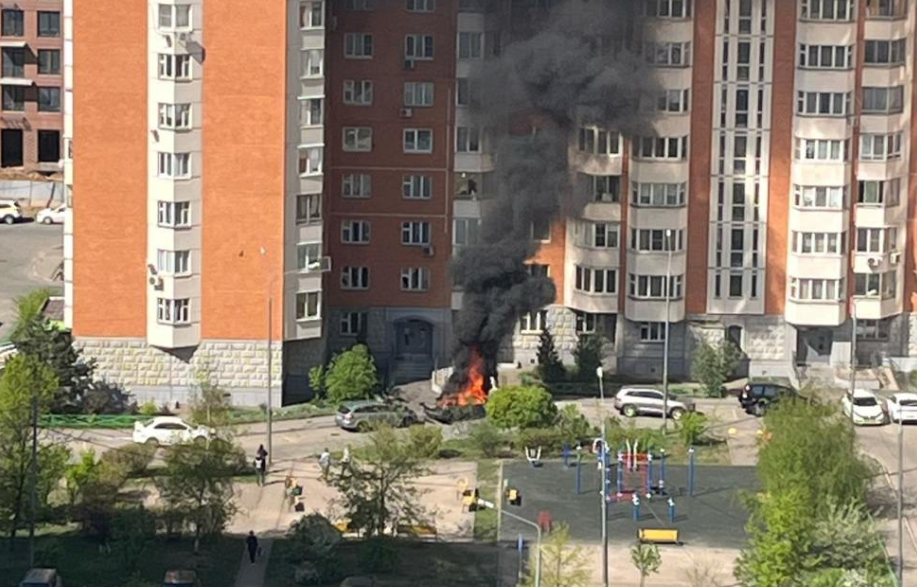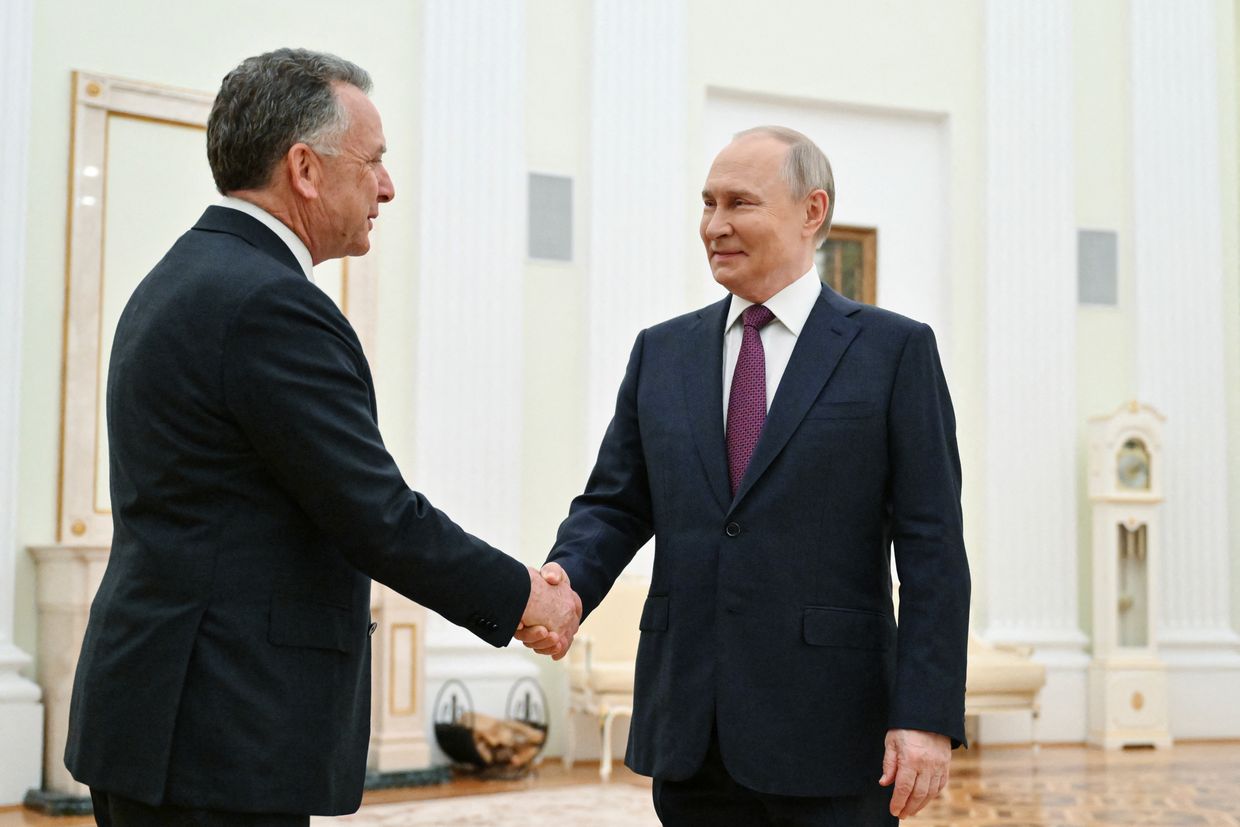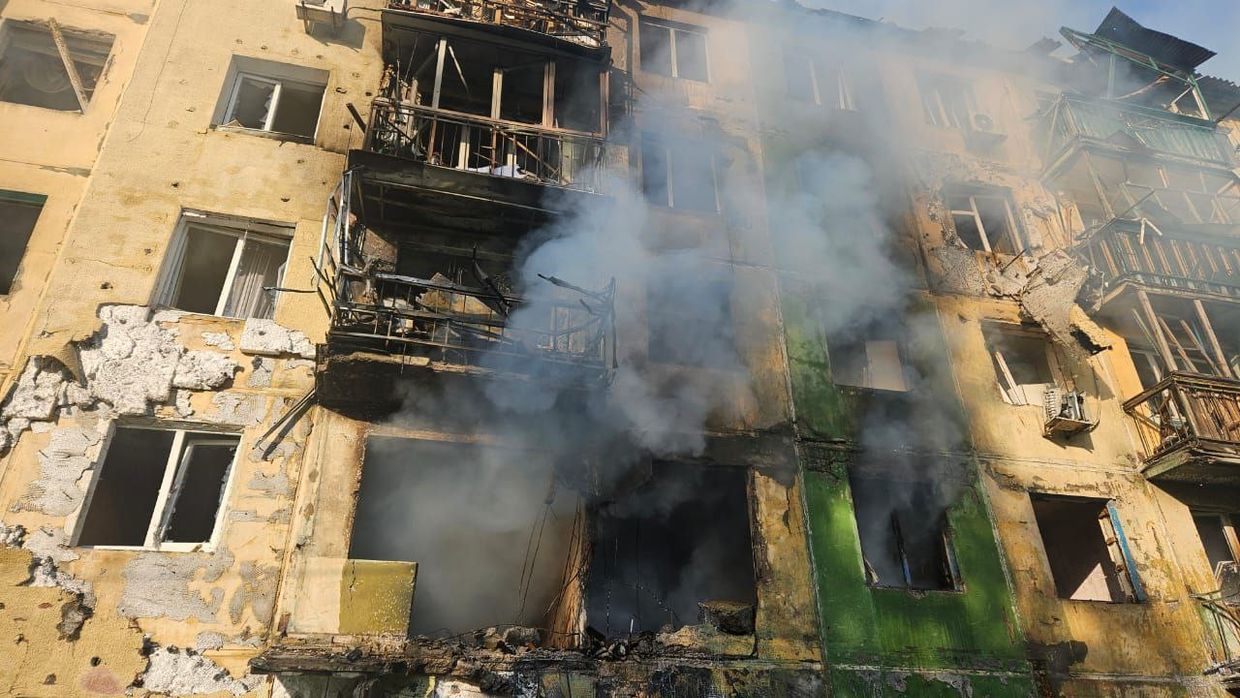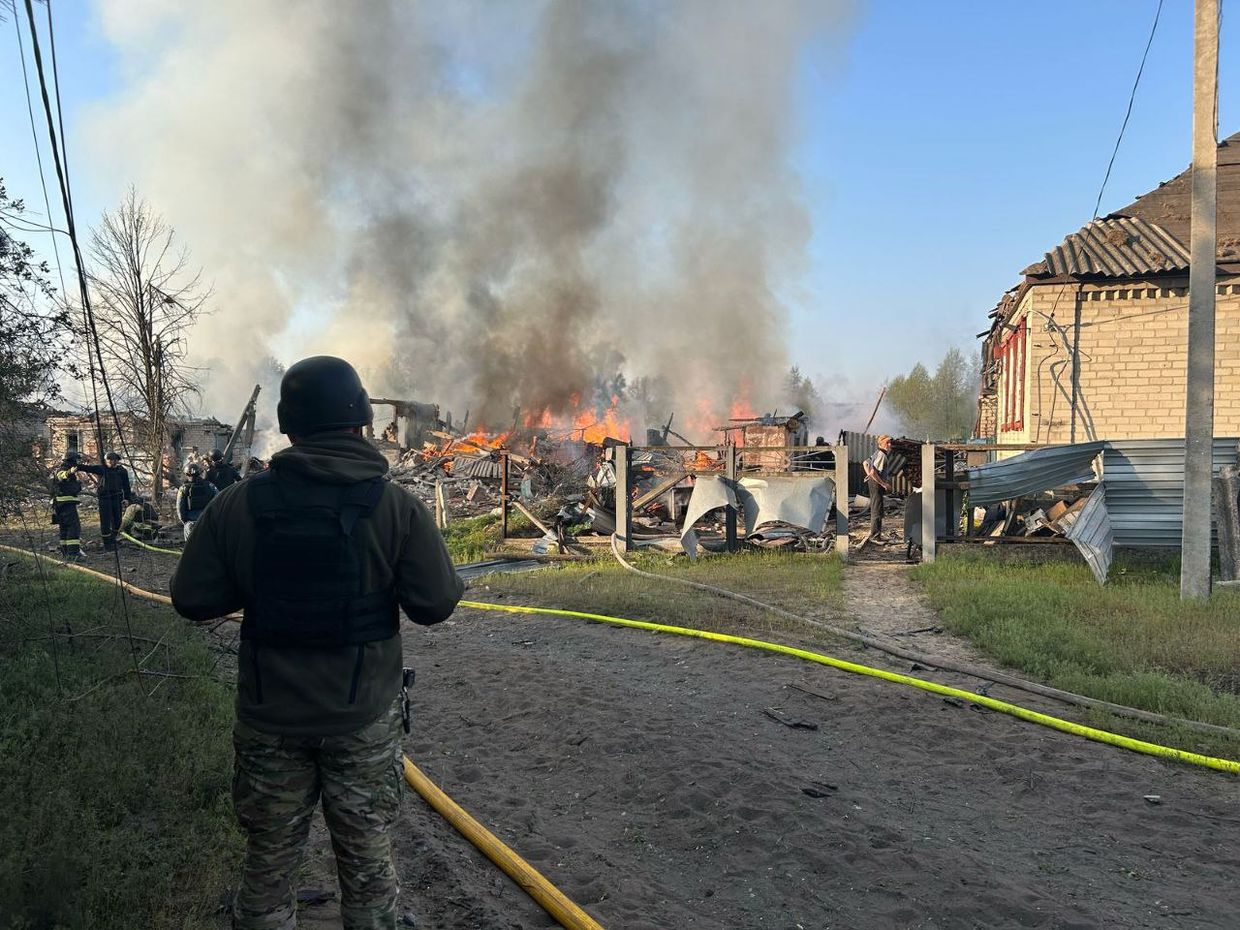As a Russian General Dies in Moscow, Peace Proposals Reveal Deep Divides Between US and Ukraine While Trump Declares “Crimea Will Stay With Russia”
Summary of the Day – April 25, 2025
The fragile dance between war and diplomacy took center stage as US Special Envoy Steve Witkoff met with Russian President Vladimir Putin in Moscow, just hours after Lieutenant General Yaroslav Moskalik was killed in a car bombing outside the Russian capital. Meanwhile, the full text of competing peace proposals revealed stark differences between the US position and Ukrainian-European counterproposals – with US recognition of Russia’s annexation of Crimea emerging as a critical flashpoint. President Donald Trump declared that “Crimea will stay with Russia,” even as Ukrainian President Volodymyr Zelensky firmly rejected territorial concessions. As diplomatic maneuvering intensified, Russian forces launched 103 drones overnight across northern and central Ukraine, while Ukrainian officials revealed that a North Korean missile fired at Kyiv contained at least 116 components made by US companies.
Blood on Moscow’s Streets: Russian General Killed as Witkoff Arrives
The shadow war between Russia and Ukraine came to Moscow’s doorstep when Lieutenant General Yaroslav Moskalik, deputy chief of the main operations directorate of Russia’s army, was killed in a car bombing in Balashikha, Moscow Oblast. According to the Investigative Committee of Russia, “the explosion occurred as a result of the detonation of a homemade explosive device” rigged to a vehicle as Moskalik passed.
Russian Ministry of Foreign Affairs Spokesperson Maria Zakharova immediately blamed Ukraine, stating there were “reasons to believe that Ukraine’s special services were involved in the murder.” Ukraine has not commented on the attack, which coincided with US Special Envoy Steve Witkoff’s arrival in Moscow for talks with Russian President Vladimir Putin.
Moskalik was identified as a member of the Russian delegation during the 2015 Normandy Format talks and participated in the 2019 Normandy Four meeting, as well as in talks with Syrian dictator Bashar al-Assad in 2018. This marks the second assassination of a Russian general in Moscow in five months, following the December 2024 killing of Lieutenant General Igor Kirillov, an operation the Ukrainian Security Service claimed responsibility for.

Two Visions, One War: Competing Peace Proposals Reveal Deep Divides
Reuters published the full text of competing peace proposals on April 25, offering the clearest look yet at the fundamental differences between the US and Ukrainian-European positions. The US plan, presented by Special Envoy Steve Witkoff to European officials in Paris on April 17, includes provisions to legally recognize Russia’s 2014 annexation of Crimea and de facto accept Russian control over Ukrainian territory seized since 2022.
In sharp contrast, the Ukrainian-European counterproposal insists that territorial questions should only be addressed after a full ceasefire and start from the basis of the current line of control.
Security guarantees represent another significant divide. The US text requires Kyiv to abandon its NATO aspirations while offering vague language about “robust security guarantees” from European and “friendly” countries. The Ukrainian-European proposal calls for reliable, enforceable guarantees from allies — including the US — and rejects limits on Ukraine’s military or its ability to host allied forces.
The documents also diverge on sanctions policy, with the US plan calling for lifting sanctions imposed since 2014, while the Ukrainian-European text proposes sanctions relief only after establishing a “sustainable peace.” Kyiv also demands the return of all deported Ukrainian children, a point the US proposal does not address.
Trump’s Crimean Calculation: “It Will Stay With Russia”
President Donald Trump sharpened his stance on territorial concessions, telling Time magazine, “Crimea will stay with Russia. And Zelensky understands that, and everybody understands that it’s been with them for a long time. It’s been with them long before Trump came along.”
Any move to formally recognize it as Russian territory would contradict a decade-long bipartisan consensus in Washington and international law. Trump also claimed Ukraine provoked the war by pursuing NATO membership—an assertion that contradicts the historical record, as Ukraine has publicly expressed interest in joining NATO since the early 2000s without triggering war.
The peace proposal has sparked backlash even from Trump’s supporters, with former UK Prime Minister Boris Johnson calling it a “reward for Russian aggression” that risks allowing Moscow to regroup for another attack.
In the same interview, Trump walked back his campaign pledge to end the war in 24 hours, calling it “an exaggeration” made “in jest,” despite having made the claim repeatedly during his campaign with no indication he was joking. And believe me, no one is laughing in Ukraine.
Zelensky’s Red Line: No Recognition of Russian Territorial Claims
President Volodymyr Zelensky firmly rejected suggestions Ukraine should give up Crimea to Russia, telling reporters in Kyiv: “Our position is unchanged. The constitution of Ukraine says that all the temporarily occupied territories… belong to Ukraine.”
While acknowledging Ukraine’s military limitations regarding Crimea, Zelensky shifted focus to diplomatic means. “I agree with President Trump that Ukraine does not have enough weapons to regain control of the Crimean peninsula by force of arms,” he said, adding that “the world has sanctions, opportunities, other economic pressure, diplomatic pressure to talk about this.”
Zelensky emphasized that Ukraine would only discuss occupied territories “after a complete, unconditional ceasefire,” insisting Kyiv is “ready for dialogue in any… format, at any time, but only after a real signal that Russia is ready to end the war.”
The Ukrainian president also revealed that a North Korean ballistic missile fired at Kyiv during Russia’s April 24 mass strike contained at least 116 components mostly made by US companies. “The lack of sufficient pressure on Russia allows them to import such missiles and other weapons – and to use them here, in Europe,” Zelensky wrote on Telegram.
Moscow Meetings: Witkoff and Putin Discuss Direct Ukraine-Russia Talks
Russian President Vladimir Putin and US Special Envoy Steve Witkoff discussed the possibility of direct negotiations between Moscow and Kyiv during a three-hour meeting in Moscow, according to Russian presidential aide Yuri Ushakov. He described the conversation as “constructive and useful,” claiming it helped bring Russian and American positions closer on Ukraine and other issues.

Kremlin spokesperson Dmitry Peskov characterized the meeting as “shuttle diplomacy.” The visit occurred just hours after Russia’s April 24 missile and drone assault that killed 12 people and injured 87 in Kyiv alone.
Trump remained optimistic about the peace process, posting on social media after the meeting: “A good day in talks and meetings with Russia and Ukraine. Work on the overall peace deal between Russia and Ukraine is going smoothly. Success seems to be in the future!” Just a day earlier, he had set a personal deadline for finalizing a deal, saying during a meeting with Norway’s Prime Minister, “They have to get to the table. And I think we’re going to get peace.”
European Outrage: Foreign Affairs Chairs Rebuke Trump’s Russia Stance
Chairs of the foreign affairs committees of eight European parliaments urged President Trump to end “the policy of appeasement” towards Russia and called for a “resolute stance” against Moscow.
“We strongly warn against yielding to its blackmail and deception,” the statement read. It was signed by chairs of the foreign affairs committees of the UK, France, the Czech Republic, Lithuania, Latvia, Estonia, and Ukraine.
“We urge an end to the policy of appeasement and call instead for a united, resolute stance against Russia’s terrorist regime,” the statement continued. “Negotiating with the war criminal Putin is evidently futile; his main objective is to undermine and humiliate our ally, the United States. We call upon all states to ensure that Vladimir Putin and all those complicit in his crimes are brought to justice.”
The officials also called for Ukraine’s immediate admission to NATO and accelerated EU accession, adding: “We must not repeat the mistakes of Munich in 1938.”
UK Reconsiders Troop Deployment: “The Risks Are Too High”
The UK is expected to scale back earlier proposals to deploy thousands of ground troops to Ukraine, as officials warn the risks are now considered “too high” for such a mission. The original plan, which included protecting Ukrainian cities, ports, and nuclear power plants, is being reconsidered in favor of a more limited and strategic presence.
A source involved in the discussions told the Times, “The risks are too high and the forces inadequate for such a task. This was always the UK’s thought. It was France who wanted a more muscular approach.”
Instead of placing troops near the front lines, the UK and France now aim to send military trainers to western Ukraine, fulfilling a commitment to deploy personnel without engaging in direct defense roles. Operation Interflex, the UK’s domestic training mission for Ukrainian troops, is expected to wind down by the end of the year, with operations relocating to a base near Lviv.
European and British officials are working behind the scenes to advance peace talks, hoping to arrange a meeting between Trump and Zelensky in Rome following the Pope’s funeral. “We will move our position, but we want Moscow to break their red lines,” one diplomatic source explained.
Mayor’s Controversial Comments: Klitschko Suggests Temporary Territorial Concessions
Kyiv Mayor Vitali Klitschko sparked controversy by suggesting Ukraine might need to give up some territory to secure a “temporary” peace with Russia. “One of the scenarios is… to give up territory. It’s not fair. But for the peace, temporary peace, maybe it can be a solution, temporary,” Klitschko said in an interview with the BBC following the deadly Russian missile-and-drone strike on Kyiv.
After immediate backlash, Klitschko clarified on Telegram: “I spoke about the fact that Ukraine could be forced to make territorial concessions in exchange for ending the war. Unfortunately, as we see, such a scenario is quite possible.” He emphasized that such concessions would contradict Ukrainian national interests and stressed his original point that “the Ukrainian people will never accept the occupation of their country by Russia.”
Ukrainian lawmakers quickly condemned the remarks. “No politician in Ukraine is authorized to change Ukraine’s borders — this is the sovereign right of the Ukrainian people alone,” said Yaroslav Yurchyshyn, chairman of the parliamentary committee on freedom of speech. “Such positions only play into the hands of the enemy, showing that pressure works, and some concessions are possible.”
Minerals Deal Delay: Trump Claims Ukraine “Three Weeks Late”
President Trump publicly pressed Ukraine on the delayed minerals deal, claiming Kyiv is “at least three weeks late” in finalizing the agreement despite the official timeline indicating otherwise. “Ukraine, headed by Volodymyr Zelensky, has not signed the final papers on the very important rare earths deal with the United States,” Trump stated, calling for immediate action.
The claim contradicts the memorandum signed between the countries on April 17, which specified that technical discussions should be completed by April 26, with the agreement to be signed shortly thereafter. Deputy Prime Minister Yuliia Svyrydenko confirmed this timeline when announcing the memorandum.
The minerals agreement has become a significant point of contention in US-Ukraine relations. It sparked a heated exchange between Trump and Zelensky during their February 28 White House meeting when the deal was initially set to be signed.
US Treasury Secretary Scott Bessent has framed the agreement as a strategic component of the peace process, saying it would “incentivize Russia to negotiate an end to its war against Ukraine.” He acknowledged in early April that “the sequencing has been thrown off, but I think we can fix it,” referring to the steps in the US peace plan.
The American Connection: CIA Deputy Director’s Son Killed Fighting for Russia
In a shocking revelation that underscores the war’s global reach, Russian investigative outlet iStories reported that Michael Gloss, the 21-year-old son of CIA Deputy Director of Digital Innovation Juliane Gloss, died while fighting for Moscow in Ukraine in April 2024.
Gloss, who departed the US in early 2023, traveled extensively in Europe before joining a hippie community called the Rainbow Family. Despite earlier anti-war positions, his social media posts show a dramatic shift in his views. On his Russian VKontakte page, he wrote: “I ran away from home (and) traveled the world. I hate fascism.” Yet he later embraced conspiracy theories about Ukraine and claimed NATO was an evolution of Hitler’s Nazi party.
After arriving in Russia in August 2023, Gloss enlisted in the Russian army by September and was stationed with the 137th Airborne Regiment in Ryazan. He was deployed to the front in December 2023, participating in assaults in Ukraine’s Donetsk region before his death in April 2024 near Bakhmut.
His family was not informed of his death until October 2024. His obituary, which made no mention of Russia, simply stated he was “tragically killed in Eastern Europe” while “forging his own hero’s journey with his noble heart and warrior spirit.”
The Human Cost: Humanitarian Aid in Jeopardy as US Funding Falls
Critical humanitarian support for displaced Ukrainians faces significant cutbacks due to US funding suspensions, the UN Refugee Agency (UNHCR) announced. The organization has been forced to scale back crucial services including psycho-social support, emergency shelter materials, and cash assistance.
“Some of the programs that we previously implemented with US funding are on hold,” said Karolina Lindholm Billing, UNHCR Representative in Ukraine. The agency’s $3.32 billion appeal to aid 8.2 million people is only 25% funded, with US contributions having previously accounted for 40% of last year’s budget.
The impact is immediate for thousands of vulnerable Ukrainians. “We had to reduce the number of people we are prioritizing,” Billing explained, noting that nearly 9,000 newly displaced individuals have passed through UNHCR transit centers in Pavlohrad and Sumy since January, often arriving “with little or no belongings and deeply traumatized.”
The humanitarian crisis stems largely from the Trump administration’s March 10 decision to terminate 83% of USAID’s foreign aid contracts. The cuts threaten continuity of support in Ukraine, where USAID has provided $2.6 billion in humanitarian aid, $5 billion in development assistance, and over $30 billion in direct budget support since Russia’s invasion began.
Deadly Strikes Continue: Russian Drones Target Pavlohrad
Russian forces launched 103 Shahed and other drones across Ukraine overnight, targeting civilian areas far from the front lines. Ukrainian air defenses managed to down 41 drones while 40 others were “lost” to electronic warfare interference, according to the Ukrainian Air Force.

The deadliest attack struck Pavlohrad in Dnipropetrovsk Oblast, killing three people—including a child—and injuring at least 15 others. The strike damaged a five-story residential building, started several fires, and partially destroyed a social institution. Among the injured were three children ages six, 15, and 17, with five victims requiring hospitalization.
Pavlohrad, a city of over 100,000 residents located 70 kilometers east of Dnipro and more than 110 kilometers from the front line, represents Russia’s continued targeting of civilian centers. Dnipropetrovsk Oblast has suffered repeated attacks, including an April missile strike on Kryvyi Rih that killed 20 people, nine of them children.
In total, Russian attacks killed eight people and injured at least 22 others across Ukraine over the past day. The strikes come as Moscow continues to reject the US-proposed 30-day ceasefire that Ukraine has already accepted.

The Tortured Journalist: DNA Tests Confirm Roshchyna’s Identity
Ukraine was devastated by confirmation that journalist Viktoriia Roshchyna, 27, was killed in Russian captivity. Her body was returned in February, but the news was withheld pending multiple DNA tests requested by her family “given the signs of torture and the condition of the body,” according to lawmaker Yaroslav Yurchyshyn.
“Russians killed the 27-year-old journalist after unlawfully detaining and torturing her for an extended period,” Yurchyshyn wrote on Telegram. An unnamed witness from the Taganrog detention center reported Roshchyna was tortured with electric shocks, had cuts on her arms after interrogations, and weighed only 30 kilograms at the time of her death.
Roshchyna disappeared in August 2023 while reporting from occupied territories and was held in at least two notorious facilities: penal colony №77 in occupied Berdiansk and detention center №2 in Russia’s Taganrog. Her death on September 19 marks the first known death of a Ukrainian journalist in Russian captivity.
At least 30 Ukrainian journalists remain in Russian captivity, with Russia having committed 833 crimes against media workers during the invasion. Since February 2022, 102 journalists have been killed, including both those on assignment and those who joined Ukraine’s Armed Forces.
Battlefield Updates: Gains and Losses Across Multiple Fronts
Ukrainian forces recently advanced in western Zaporizhia Oblast, with geolocated footage showing troops gaining ground in the southeastern outskirts of Mala Tokmachka. Conversely, Russian forces made gains in Sumy Oblast along Pratsi Street in southern Zhuravka and in the Pokrovsk direction, advancing to southern Lysivka.
Russian forces continued offensive operations across multiple fronts without making confirmed advances in the Siversk, Chasiv Yar, Toretsk, Novopavlivka, Kurakhove, and Velyka Novosilka directions. In the Chasiv Yar direction, Russians conducted a company-sized mechanized assault using six armored vehicles and five civilian passenger cars, according to Ukraine’s Khortytsia Group of Forces.
Despite Russia’s continued pressure, military analysts maintain that Ukraine is not in a position that would necessitate accepting an unfavorable peace deal. “Ukraine’s position is nowhere near bad enough that they would need to make such concessions, especially when Russia isn’t making any actual concessions,” said Jakub Janovsky, an analyst with the Oryx project tracking equipment losses.
Oleksandr Spytsin, a drone unit commander near Pokrovsk, described the relentless but ineffective nature of Russian attacks: “When they take a serious beating, the next day their activity drops… Then maybe they don’t operate for a day, or they focus on another direction, and then they’re back here again, acting like nothing happened.”
Looking Ahead: Rome Summit Looms as High-Stakes Diplomacy Continues
All eyes turn to Rome, where President Zelensky and President Trump may meet on April 26 during Pope Francis’s funeral. The potential encounter would be their first since a tense February meeting in the White House, where Trump criticized Zelensky for what he deemed a lack of gratitude for American support.
Zelensky’s attendance remains uncertain due to pressing matters in Kyiv following Russia’s April 24 missile strike. “If I don’t have time, Ukraine will be represented at a decent level. The Foreign Minister and the First Lady will be there,” he told reporters.
With Trump threatening to withdraw from peace efforts without prompt progress, and Russia rejecting the US-proposed 30-day ceasefire while continuing offensive operations, the coming days could prove decisive for Ukraine’s future. The meeting in Rome could be especially significant as European and British officials hope to advance peace talks, with one diplomatic source explaining, “We will move our position, but we want Moscow to break their red lines.”
Meanwhile, Ukraine’s financial future presents another challenge. Prime Minister Denys Shmyhal announced that Ukraine expects to receive over $39 billion in confirmed budget support from international partners in 2025 but warned that 2026-2027 will pose significant challenges to macro-financial stability. “The best option would be the full confiscation of frozen Russian assets and their transfer to Ukraine,” he stated, noting that the $300 billion in frozen assets is still far less than the $524 billion needed for Ukraine’s 10-year recovery according to World Bank assessments.
As humanitarian support also falters due to US funding cuts, the UNHCR has had to scale back support for newly displaced Ukrainians. “Some of the programs that we previously implemented with US funding are on hold,” said Karolina Lindholm Billing, UNHCR Representative in Ukraine, noting that nearly 9,000 newly displaced individuals have passed through transit centers since January, often arriving “deeply traumatized.”
